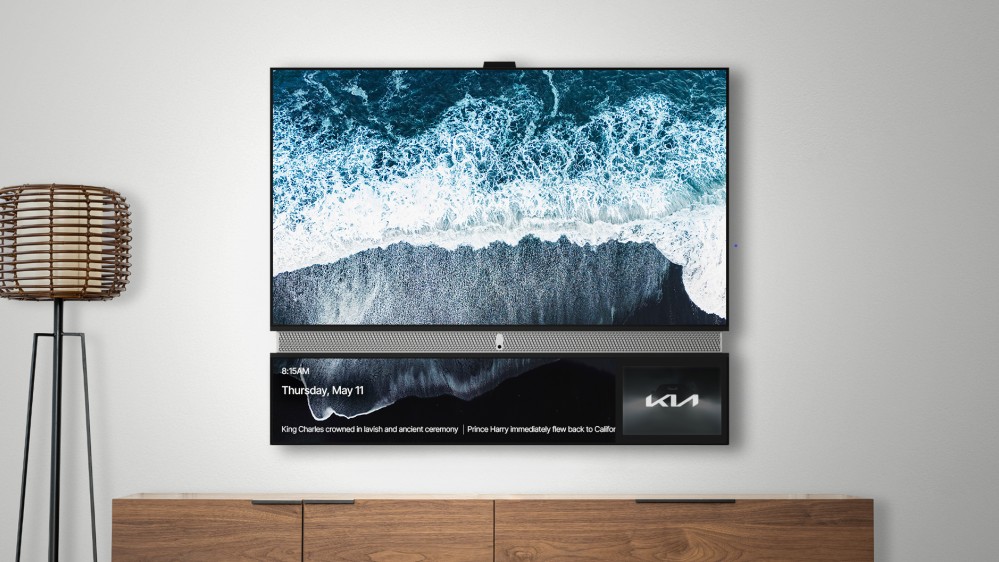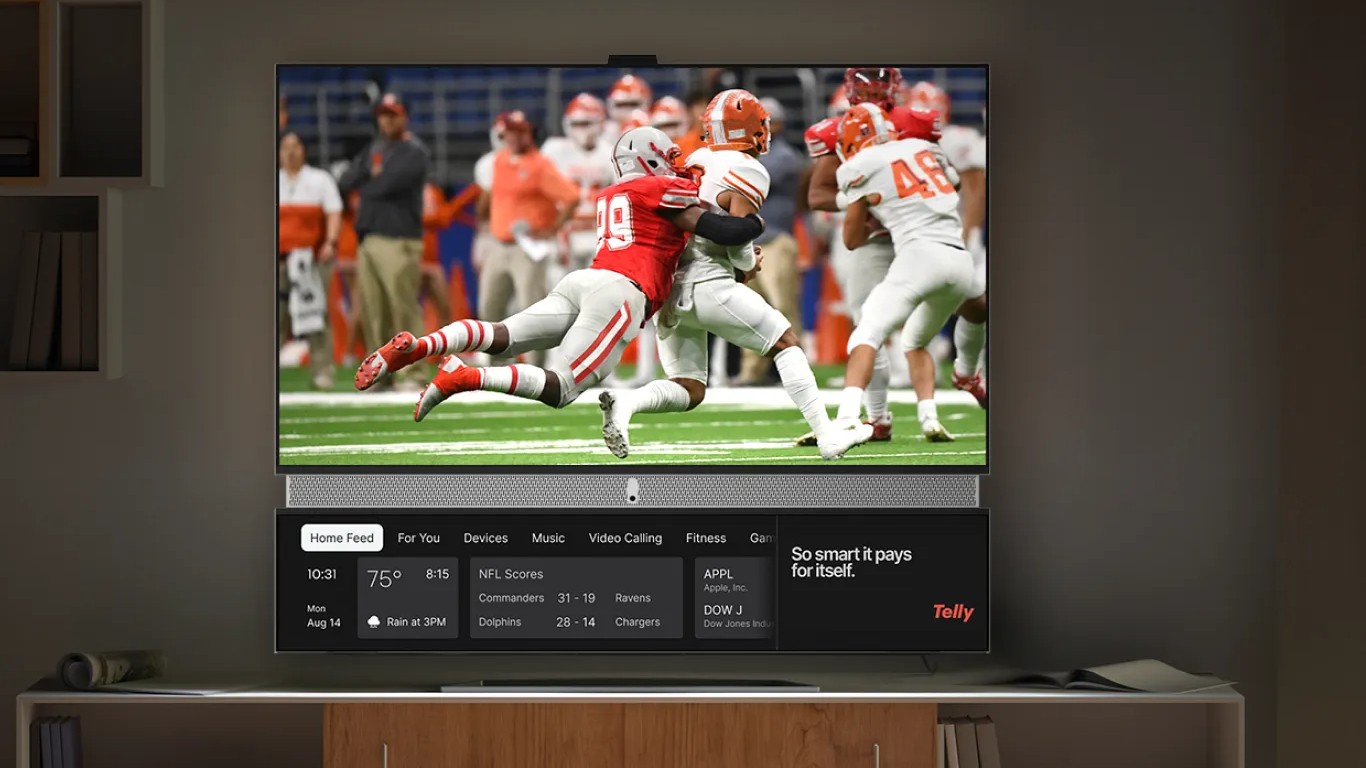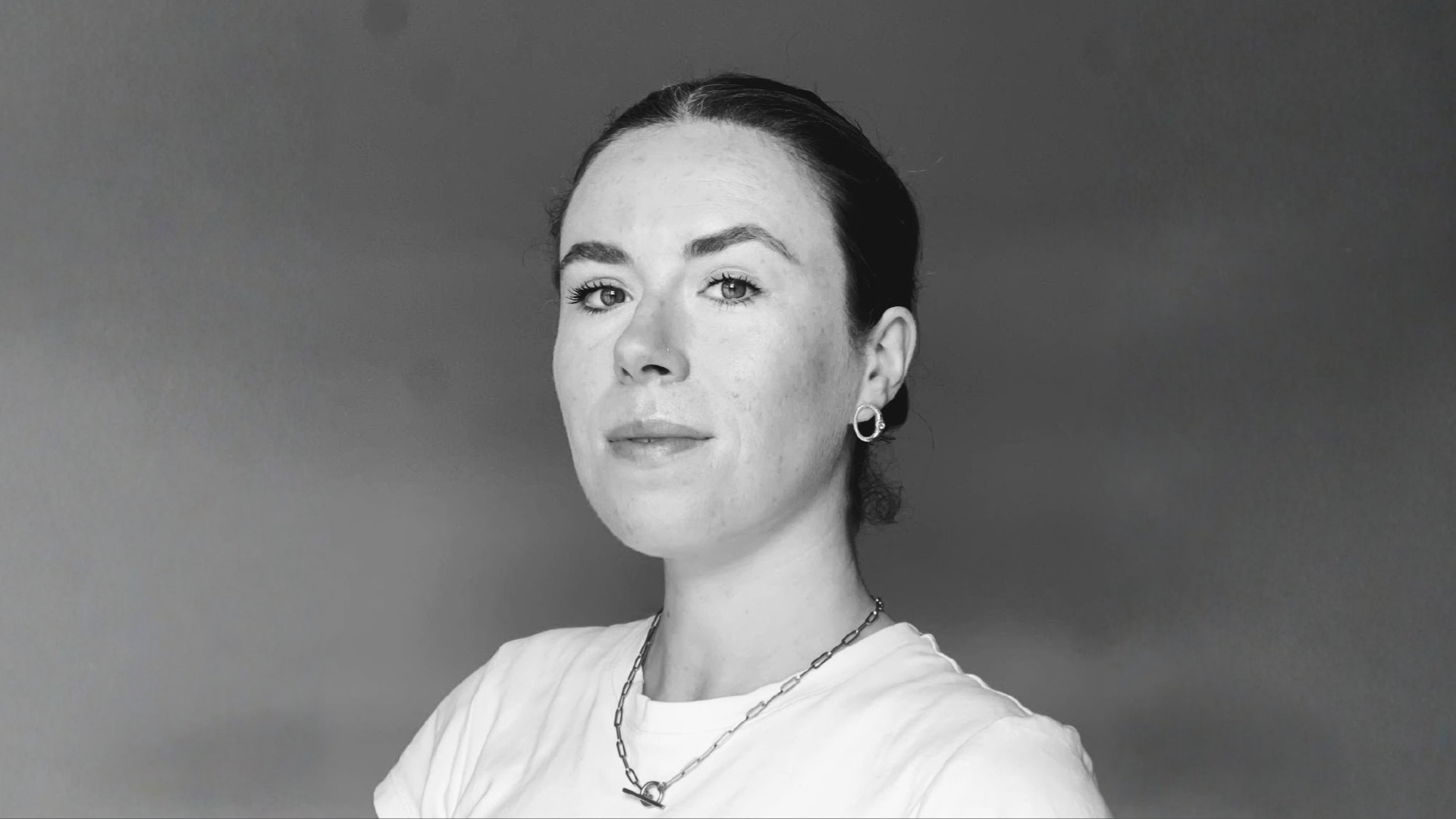
I've been thinking about Telly, the free television that's currently worming its way into American homes, and I can't shake the feeling that we're witnessing something rather significant. Not necessarily in a good way, like the rise of the best Frame TVs. More in the "this is how it starts" way.
If you haven't heard of it, here's the deal: Telly will give you a 55-inch 4K television completely free. There's just one catch. It comes with a secondary screen below the main display that shows adverts whenever the top screen is on. The only way to switch it off is to switch the top screen off.
You can't cover it up – it's in the terms of service – and you must agree to use Telly as your main TV, keep it connected to the internet, and watch it regularly, or they'll fine you a grand and demand it back. In short, it's a physical manifestation of the adage: "There's no such thing as a free lunch".
Why this actually works
So who would accept this devil's bargain? Plenty of people, as it turns out, and not because they're stupid. The economics make a grim sort of sense.
TVs are cheaper than they used to be, but free still beats cheap. And it's a pretty decent TV, featuring a proper 4K display, a soundbar, RGB lighting, and all the streaming apps via an included dongle. In exchange, you become a captive audience for advertisers and hand over endless data about your viewing habits, your household, and potentially your conversations.
The business model isn't complicated. Advertisers pay Telly to guarantee your eyeballs. Not the "maybe they'll see it" kind of guarantee you get with traditional ads. An actual, physical guarantee, enforced by a screen you cannot dismiss, playing ads you can't dodge.

Every ad impression is verified. Every piece of data about what you watch, when you watch it, and who's in the room is captured. That data gets packaged and sold. The whole thing is surveillance capitalism at its most nakedly transactional. It's enough to make Charlie Brooker give up writing TV forever, because reality has begun to overtake Black Mirror on every available count.
Daily design news, reviews, how-tos and more, as picked by the editors.
In Telly's defence, of course, most of this isn't particularly new; it's just that they're saying the quiet part out loud. As Dallas Lawrence, chief strategy officer, points out to me: "Every connected TV manufacturer today uses viewing data and household data to support advertising. The vast majority of revenue from the biggest TV manufacturers today comes from advertising as they have commoditised the price of the TV so significantly.
"The difference with Telly is transparency and value exchange," continues Dallas. "We’re upfront about how it works, and in return, consumers get a high-end connected platform that goes way beyond just TV for free. That clarity is one of the reasons over a million people have already signed up for Telly and why our usage rates far out-pace traditional TVs in homes."
She adds that, unlike nearly every other company in the TV space today, Telly requires three separate privacy opt-in agreements. "We do not bury our terms or force you to purchase a TV before even seeing them. Consumers appreciate the transparency."
Where else might this work
So here's where I start to wonder... why would this stop at TV?
Imagine a high-powered laptop, free, with a little strip of screen above the keyboard that shows ads all the time. For students, for people starting businesses, for anyone who needs a computer but can't afford one, that might sound reasonable. This laptop would monitor what you type, what websites you visit, what you work on. All valuable data. All monetisable.
Or phones. Gosh, phones would be perfect for this. A free smartphone with a thin banner of ads running along the top or bottom of the screen at all times. One that couldn't be dismissed, can't be blocked. With front and rear cameras, mic and GPS that were all, always connected.
VR headsets seem like a natural fit too. Imagine ads in virtual reality that you cannot look away from because they follow your gaze. Imagine the data from monitoring someone's movements, reactions, and behaviour in a fully immersive environment.
What if car manufacturers offered free vehicles in exchange for a dashboard screen that showed ads whenever you were parked? After all, your car knows where you go, where you shop, where you work, how fast you drive, whether you wear your seatbelt. It's all very valuable stuff.
Smart homes might be next. Imagine a landlord offering flats with reduced rent in exchange for installing smart speakers, cameras, sensors throughout. The idea being the data generated by monitoring your household – combined with guaranteed exposure to advertising through smart mirrors, smart fridges, even smart windows – would offset the cost of the lower rent. Financially smart. But also, yuck.
The exchange we're making
I'm not saying any of this is inevitable. But Telly represents a proof of concept that should worry anyone who cares about privacy, autonomy, or just not being constantly advertised at in their own home.
The exchange we're being offered is simple: you can have things for free, but you pay with your attention, your data and your privacy. And judging by how successful free-but-ad-supported models have been online – where nearly everything is free as long as you tolerate ads and tracking – it's not hard to imagine this expanding into the world of devices and hardware.
I can't tell you whether you should accept that exchange; that's personal. But I can tell you that once we normalise it for TVs, it gets easier to normalise it for everything else. Once it's normalised, it becomes the default. And once it's the default, the choice disappears.
You have been warned.
For a different type of TV, see why we've been coveting Samsung's Serif TV.

Tom May is an award-winning journalist specialising in art, design, photography and technology. His latest book, The 50 Greatest Designers (Arcturus Publishing), was published this June. He's also author of Great TED Talks: Creativity (Pavilion Books). Tom was previously editor of Professional Photography magazine, associate editor at Creative Bloq, and deputy editor at net magazine.
You must confirm your public display name before commenting
Please logout and then login again, you will then be prompted to enter your display name.
